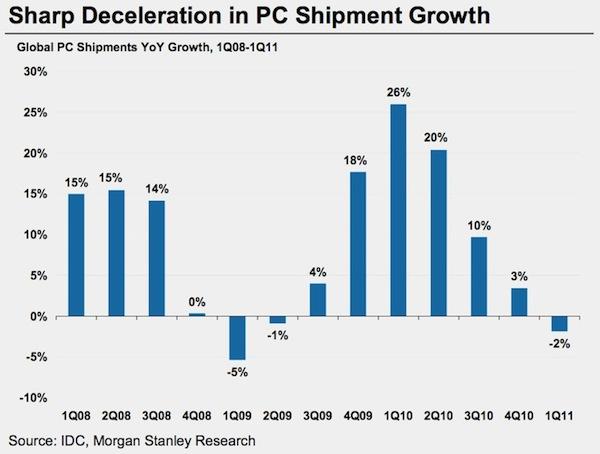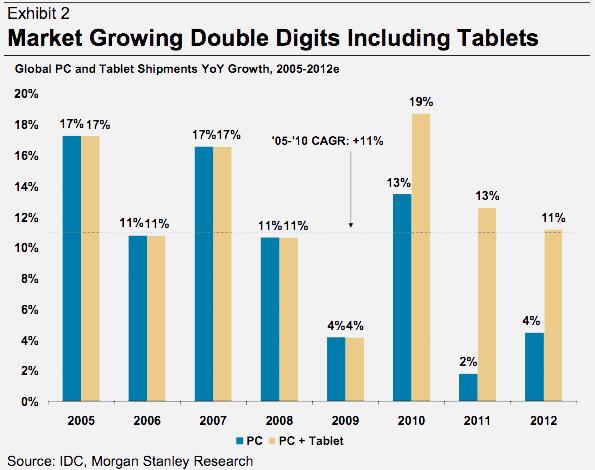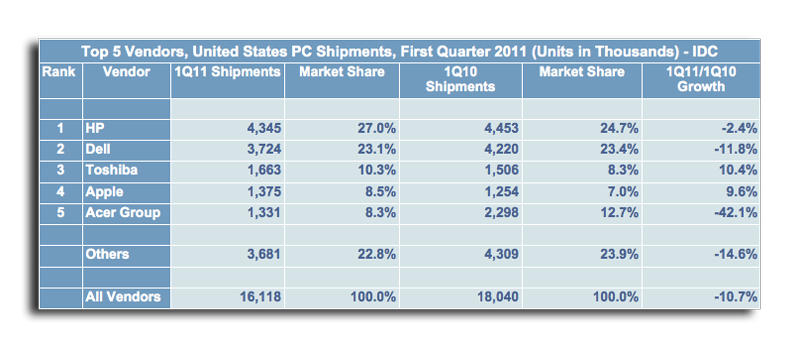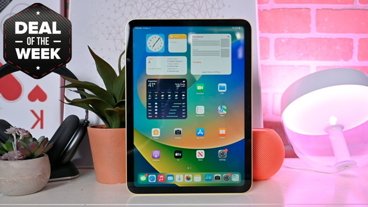In a note issued to clients Thursday, Morgan Stanley analyst Katy Huberty revised her 2011 PC shipment growth forecast to two percent, down from seven percent, citing weakened demand caused by tablets. Huberty also attributed the decline to considerable slowing in commercial and emerging market consumer demand for PCs.
In light of the revised estimates, Huberty lowered her revenue forecasts for HP, Dell and Seagate by one to two percent, while maintaining her estimates for Apple due to "strong Mac share gains and unit upside" in the first quarter of calendar 2011.
According to Huberty, Dell is exposed to "the greatest risk" due to decelerating commercial demand and margin risk from component costs.
Huberty lowered her consumer PC shipment estimate from 2 percent growth to a 1 percent decline and dropped commercial PC unit growth projections for 2011 from 13 percent to 5 percent.
Morgan Stanley's tablet forecast remained unchanged at 55 million units in 2011 and 85 million units in 2012. Huberty estimates a tablet cannibalization rate of 29 percent in 2011, noting that when PCs and tablets are considered together, total shipments are expected to grow by 13 percent in 2011, in-line with historical PC growth trends.
Also on Thursday, analyst Brian White of Ticonderoga Seurities warned of slowdown in the Electronics Manufacturing Services industry, as Printed Circuit Board book-to-bill ratios have flatlined at their lowest level in over two years. "Our stance remains that the PCB book-to-bill ratio is in a bottoming phase, and we do not expect a meaningful downtick from current levels; however, we also do not expect a meaningful rebound as in past recoveries," said White.
Microsoft's struggles are also seen as an indication of slowing PC sales. For the first time in recent memory, Apple beat Microsoft in both revenue and profit for the just finished quarter.
Though the Redmond, Wash., software giant's profits grew past Wall Street expectations year over year, analysts quickly seized on the news that sales of netbooks fell 40 percent last quarter and Windows revenue declined year over year for the second-straight quarter as indicators of slowing PC growth.
The dramatic drop in netbook sales may indicate that the iPad has substantially eaten into the profits of low-end laptops. Given that Apple is having trouble meeting demand for the iPad 2, analysts worry that sales of PCs, especially netbooks, will decline further as Apple ramps up production of the iPad.
Earlier this month, research group IDC released first quarter sales figures for the PC market that suggest the PC market dropped 10.7 percent while U.S. Mac sales grew 9.6 percent.
Netbook maker Acer appears to have been hit especially hard by the rise of the iPad. According to IDC, Acer PC shipments declined 42 percent year over year in the first quarter.
Gartner also sees U.S. PC sales declining, though the research group's estimate of a 6.1 percent contraction is less of a loss than IDC's 10.7 percent figure. Also of note, Gartner sees Apple's iPad continuing to dominate the tablet market through at least 2015.
 Josh Ong
Josh Ong









-m.jpg)






 Charles Martin
Charles Martin
 Malcolm Owen
Malcolm Owen
 William Gallagher
William Gallagher

 Christine McKee
Christine McKee
 Wesley Hilliard
Wesley Hilliard

 Andrew Orr
Andrew Orr








33 Comments
Interesting report, and though the popularity of the iPad is certainly admirable, until iOS actually incorporates a user accessible file system, and absolutely zero dependance upon other computers in order to activate/sync/backup, etc it'll never truly be able to serve completely as a 'Post-PC' device.Maybe someday... but it's just not quite ready yet - IMO.
...it'll never truly be able to serve completely as a 'Post-PC? device.
Don?t confuse post PC with sans PC.
Interesting report, and though the popularity of the iPad is certainly admirable, until iOS actually incorporates a user accessible file system, and absolutely zero dependance upon other computers in order to activate/sync/backup, etc it'll never truly be able to serve completely as a 'Post-PC' device.Maybe someday... but it's just not quite ready yet - IMO.
Nice to see you back, my friend.
Don’t confuse post PC with sans PC.
Correct.
The iPad isn't kicking all PCs back to the curb. However, it's replacing the second, third, fourth PC.
It may only be capable of doing 75-85% of what a conventional PC does, but you may be using the media tablet for 75% of the time, until you need to get "serious work" done.
Cloud systems (Dropbox, Box.net, etc.) are already making the traditional PC hierarchical data storage paradigm irrelevant.
I sure hope Foxconn can pump out at least 45 million iPad 2s this year for Apple. I want to see how badly those numbers will eat into sales of new Windows netbooks, especially those Frankennetbooks with flippable displays. The Wintards claim that consumers will find them more useful than tablets, but I think consumers really just like the simplicity and light weight of tablets rather than having the power of Windows. I know that Microsoft will continue to downplay the pressure that the iPad is putting on Windows sales, but if Apple really sells the crap out of the iPad 2, there's no way Microsoft is going to cover up those losses. It'll have to be exposed just as the PC vendors had to show their netbook numbers decline. As iPad sales increase so will Apple's quarterly revenue, and as Windows netbook sales decline, Microsoft's quarterly revenue should decrease along with them.
I hope the iPad 2 changes the face of consumer computing by making it much more simpler for consumers to manage a home computing device. Windows isn't going away any time soon, but I'm happy to see numbers decreasing even if slowly. If Apple is fortunate, the iPad halo effect might increase Mac desktop sales to some degree. Every little bit helps.